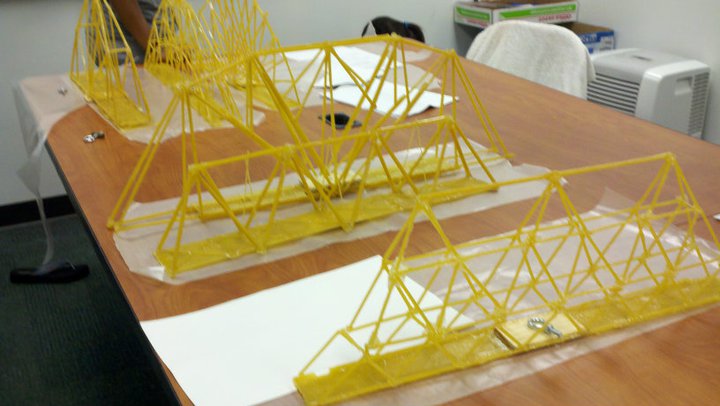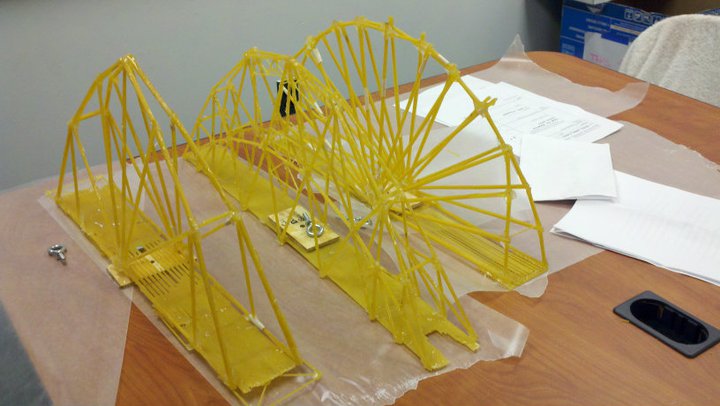Difference between revisions of "Investigations in Engineering"
| Line 36: | Line 36: | ||
First, this course is the only one that requires an essay be written BEFORE the course, to be handed at the beginning of the first class. For more information regarding the pre-course essay: [http://cty.jhu.edu/summer/ieng.html] | First, this course is the only one that requires an essay be written BEFORE the course, to be handed at the beginning of the first class. For more information regarding the pre-course essay: [http://cty.jhu.edu/summer/ieng.html] | ||
| − | You'll be graded on several lab reports, two oral presentations, and two essays (one of which is the aforementioned essay before you get to CTY.) In addition, this class includes a midterm exam, as well as a final. The culmination of the course is designing, constructing, and testing a bridge constructed entirely of spaghetti and epoxy. | + | You'll be graded on several lab reports, two oral presentations, and two essays (one of which is the aforementioned essay before you get to CTY.) In addition, this class includes a midterm exam, as well as a final. The culmination of the course is designing, constructing, and testing a bridge constructed entirely of spaghetti and epoxy (both of which you will find in the must unexpected places a week later). [[File:bridge1.jpg]] [[File:bridge2.jpg]] |
The labs consist of several virtual labs, as well as the infamously complicated "Material Science" lab and the arduous "Remote Measurement" lab. I don't want to spoil the surprises, but let's just say it's extremely easy to screw up the former and the latter requires extreme patience and metersticks. | The labs consist of several virtual labs, as well as the infamously complicated "Material Science" lab and the arduous "Remote Measurement" lab. I don't want to spoil the surprises, but let's just say it's extremely easy to screw up the former and the latter requires extreme patience and metersticks. | ||
Revision as of 17:51, 24 July 2011
Investigations in Engineering, coded as IENG and nicknamed Fast-paced Death, is based on the Johns Hopkins freshman engineering course What is Engineering?. IENG is offered only at the Johns Hopkins site, has a precalculus prerequisite, and has been taught for the last 10 years by Dr. Jack Bartholomew. If a CTYer scores well enough on tests and assignments (yes, this class does involve grades) and pays $300, he or she can earn three Hopkins college credits. It is one of, if not THE, most intensive course CTY offers.
Course Description
According to the CTY website:
"This class asks students to do more than calculate the solutions to well-posed, simplified problems. Rather, they are asked to translate problems often encountered by engineers (with no obvious solutions) into ones which can be tackled and resolved. These open-ended assignments require hands-on exploration. Some of the exploration uses a virtual environment with a set of laboratory experiments developed in HTML and Java. These exercises require students to develop a broad understanding of how to solve engineering problems. The virtual laboratory includes exercises such as drilling for oil, remote measurement, electronic circuit design, logical circuit design, and building a robotic arm."
In addition, you'll cover Fermi problems, dimensional analysis, engineering design processes, material properties, error propagation, approximation, engineering ethics, and binary systems/digital logic.
Here is the syllabus: [1]
As one can tell, the courseload for this class is extremely intense. It is highly recommended that only older, more mature students attempt this course. The speed at which information is dealt out during lectures and the pile of assignments required for the course is, in the humble opinion of a survivor of the class, only suitable for 15-17 year olds.
History
IENG has been taught for at least the last 10 years. It's exact origin is unclear.
CTY's photographers and videographers will often drop by during the bridge building and breaking to take videos and record testimonies of why CTY is so cool :D
2011.1
in 2011, 16 brave souls (14 boys, 2 girls) subjected themselves to this extremely grueling course, for knowledge, college credit, and the greater good. The boys, Chris Little's hall, formed the closest, most bro-like hall ever. The hall ate together during almost all meals, played ultimate frisbee as a team, and in general did the same activities. From the first day it was decided that the whole hall be entered into the ultimate frisbee tournament. Kavin Sanghavi signed everyone in the hall up for the ultimate frisbee weekly activity to train. - we lost, but we still had the most spirit. and uniforms. New inside jokes were made almost every day, and we had deep conversations over chinese food in the hallway. Chipotle was also good. We had one of the chillest RAs ever, and the only person who had live glowsticks for raving at JHU that session, Xinyuan Chen. The hall was made up of Goku-l "'fro" Aoskan, Gareth "Frisbee maniac" Chen, Chris "beast" Yu, David "Bro" Cho, Kavin "raving guitarist" Sanghavi, Kiran Jagtiani of the depressing music, Harry "Robot" Brennan, William "D'arcy" Kenworthy The Fourth, Joon "8-year old" Kim, Sahil Gupta the 40-year Old Engineer in Disguise, Dani Casas Bofarull the Smooth-voiced, Suave, Spanish Lad, Tyler "The one who sings really high" Postle, Andrew "way tall" Schade, and Xinyuan "MC/Raver/Random guy with flute" Chen.
Instructors
IENG has been taught for the last ten years by Dr. Jack Bartholemew, although everyone calls him "Jack" and no one thinks of him as Dr. Bartholemew. He is a generally laid-back but extremely sharp guy who will blow your mind during lectures. He is fond of wearing brightly colored sneakers, shorts, and a t-shirt.
During each morning session, Jack gives a lecture on various aspects of Engineering. The course is taught like a college course, which means that the information flows ridiculously fast, and not much time is spent dwelling on certain topics. It is helpful, if not essential, to bring a notebook and take notes. There is not really any other way to fully absorb what Jack is teaching. If you find yourself understanding concepts 3 days after they're taught, congratulations- this is normal.
Jack is usually available during the afternoon or evening sessions if you need help. If you are clueless about ANYTHING, is is highly recommended that you talk to Jack or your TA AS SOON AS POSSIBLE. Almost guaranteed, the next day's lecture will bring more questions, in a vicious circle. Jack is very approachable and will do his best to explain the complex concepts to you, so it never hurts to ask.
Workload
Two words: Mad Pre-Calc/Physics. Wait, that's three.
First, this course is the only one that requires an essay be written BEFORE the course, to be handed at the beginning of the first class. For more information regarding the pre-course essay: [2]
You'll be graded on several lab reports, two oral presentations, and two essays (one of which is the aforementioned essay before you get to CTY.) In addition, this class includes a midterm exam, as well as a final. The culmination of the course is designing, constructing, and testing a bridge constructed entirely of spaghetti and epoxy (both of which you will find in the must unexpected places a week later). 

The labs consist of several virtual labs, as well as the infamously complicated "Material Science" lab and the arduous "Remote Measurement" lab. I don't want to spoil the surprises, but let's just say it's extremely easy to screw up the former and the latter requires extreme patience and metersticks.
To even comprehend the material, let alone earn credit for this class, you WILL find yourself doing work outside of class. Paradoxically, this is against CTY policy. However, what Hopkins lacks in CTY tradition, it makes up for with lenient lights out reinforcement depending on your RA, which means you most probably won't get caught completing work. Personal interjection: in 11.1 the boys were caught once, in the third week for staying up past lights out. It is recommended one brings a contraband flashlight and keep your room lights off. they can see them from outside.
A requirement for the course is a 1 GB flash drive, which you WILL need. In addition, it won't hurt to bring a laptop armed with word processing, excel, and powerpoint; however, keep in mind that laptops are considered contraband at CTY. Fortunately, most RAs at JHU are fairly understanding of the difficulty of the course and will turn a blind eye towards it.
A vast majority of the course consists of group projects, so not only will this course teach you extreme algebra and physics, but you will also learn how to work in a group. The class usually becomes quite tight-knit, because you work with each other so much. You need each other's help, and you need everyone to have your back; whether it be writing labs together at 2 AM, sitting next to your partner who's writing labs at 2 AM for moral support, or explaining midterm topics the midnight before the midterm.
